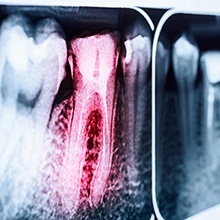

In Virginia Beach, VA, our caring dentists understand how to create comfortable treatments for uncomfortable dental conditions. Tooth pain usually indicates a major problem for your oral health. In fact, you may need root canal therapy! If you or a family member is experiencing pain, aching, or throbbing in one or more teeth, please call Smile by Design of Virginia Beach now to make an appointment.

A toothache generally indicates a root canal infection. Root canal infections occur most often in teeth compromised by decay or cracks, or teeth that are broken. Oral bacteria infiltrate the tooth’s interior and infect the nerve and pulp. Once these tissues become diseased, the only way to save to your tooth is to perform root canal therapy. If the tooth is very infected or just too far gone, it may be necessary to extract the tooth. However, our Virginia Beach dentists always try to perform the most conservative treatments that will save as much tooth structure as possible.

Toothaches and intense tooth pain are often the results of root canal infections. Other symptoms of this dental condition include:

Experiencing tooth pain of any kind is never good, and the longer you wait to see the dentist, the worse the damage to your tooth and gums. With root canal therapy, our dentists will remove the diseased tissues, gently clean the interior of your tooth, and then fill it with a dental material called gutta percha. Root canal therapy alleviates toothache pain and returns your oral health.
If you’re fearful that root canal therapy may be painful, please know that our team at Smile by Design of Virginia Beach focuses completely on your optimal comfort throughout the course of your treatment. At our Virginia Beach office, we are very gentle and we want to alleviate your dental pain as quickly as possible.

After your root canal therapy is completed, we recommend the addition of a porcelain crown. Getting a tooth restoration is an important follow-up to root canal therapy. Once the diseased tissues have been removed and the tooth cleansed, it becomes hollow, and therefore weakened. Adding a porcelain crown strengthens your tooth, and ensures your smile remains beautiful for years to come.

Root canal treatment can save your tooth from being extracted! However, you may be worried about the cost of your upcoming treatment, so we’re here to help! During your visit with us, we would be more than happy to discuss the exact cost of your treatment. In the meantime, here are some things for you to take into consideration.

It’s very difficult to determine the exact cost of your treatment until we can examine the area. There are a variety of factors that are taken into consideration, including:

It can be tempting to skip a root canal and opt for an extraction instead. This may appear more affordable upfront, but you should consider the long-term effects of this decision. For example, your bite can be negatively affected by the surrounding teeth shifting into the empty space. This requires additional treatments to keep your smile healthy. To keep this from happening, a dental implant or bridge would likely be recommended to replace your missing tooth. These procedures can add up. By saving your tooth now with root canal treatment, you can save quite a bit of money in the long run.

Root canal treatment is considered to be a “major procedure,” so dental insurance often covers approximately 50% of the treatment after your deductible has been met. However, every plan is different, so you should confirm this with your insurance provider ahead of time. You don’t want any unnecessary surprises. Our team is more than happy to help if you need assistance understanding how your plan works.

If you don’t have dental insurance, this doesn’t mean that you will be left completely on your own. We accept payment through CareCredit – a third-party financing company that can split the cost of your treatment into manageable monthly installments with little to no interest. For more information on your financial options, don’t hesitate to give us a call!

Are you ready for your root canal treatment, or is there something you want to ask about the procedure first? We enjoy any opportunity to educate our patients about our services so that they can make the oral health decisions that are right for them. The FAQs below cover some common topics that our patients often ask about before undergoing root canal therapy. If there’s anything else you want to know, please give us a call!
Usually, recovery only takes a few days. In fact, in some cases, you might be able to return to your normal routine the day after the surgery. Patients with jobs that require physical labor might need to stay home longer, as vigorous exercise could divert blood from the mouth and extend the healing process.
While you’re recovering, you can take prescribed or over-the-counter pain medication to manage any soreness you might be experiencing. You should also only eat soft foods, as trying to chew anything hard and crunchy could cause discomfort. When brushing and flossing, be gentle whenever you’re cleaning near the treated tooth.
Once the numbness in your mouth wears off, you’ll likely feel some mild discomfort, soreness, and sensitivity. Ibuprofen and similar store-bought medications are usually enough to help you keep your pain under control. You can typically expect the discomfort to start to subside after three days.
If your pain lasts longer than it should or becomes severe, you might have developed a new infection. Call our office immediately so that you can describe your symptoms to one of our team members; if necessary, they can schedule an appointment for you so that we can identify and address the problem.
In general, root canal therapy can take anywhere between 30 to 90 minutes. The exact length of time can vary based on which teeth are being treated. The molars near the back of your mouth tend to have more root canals than the front teeth, so they take longer to thoroughly clean.
It’s worth noting that while root canal therapy can typically be completed in just one appointment, sometimes two might be required. During the first one, an antibacterial medicine is placed inside the tooth to help reduce your pain. When you return for the second visit, the inside of your tooth will be thoroughly cleaned.
You might have heard claims that root canals can increase your risk for certain medical conditions. This is not true; the idea comes from research conducted nearly a century ago that has since been disproven. The truth is that root canals are considered very safe and have a high success rate. There is a chance of some bacteria remaining in the tooth and causing a new infection, but this rarely happens. Nevertheless, you should call us immediately if you notice any unusual symptoms such as fever or intense swelling.